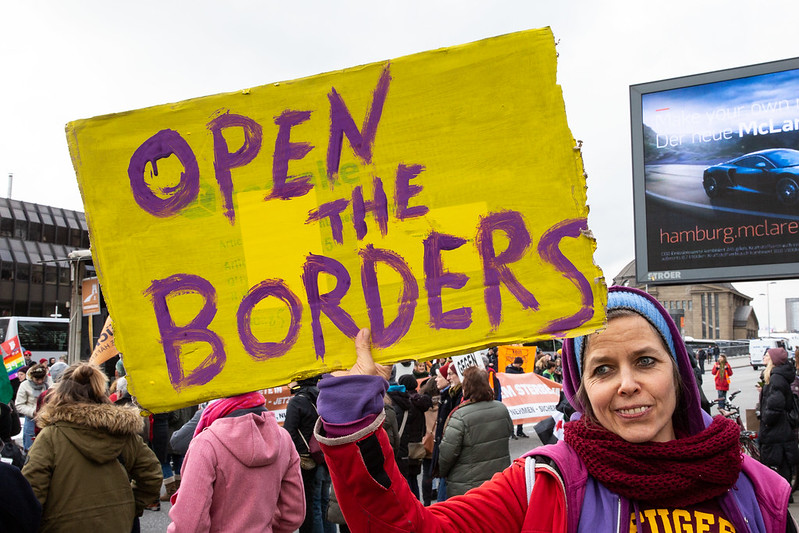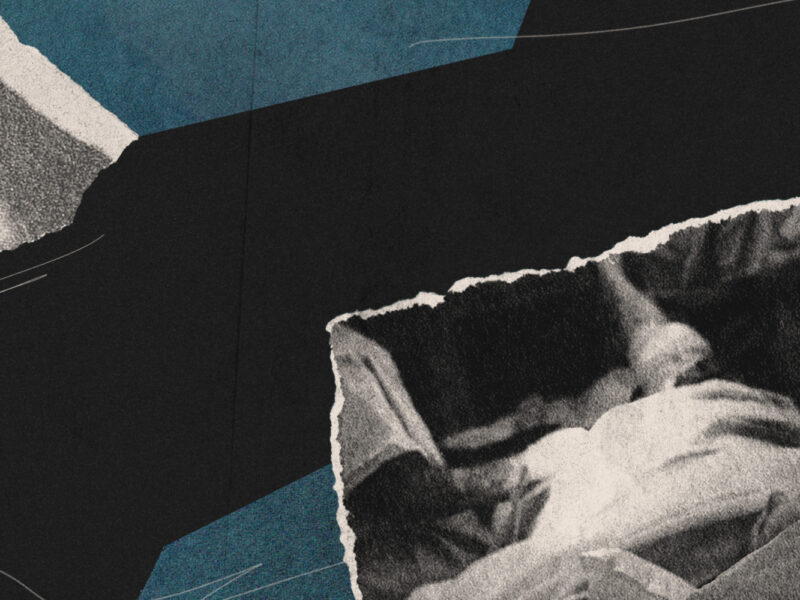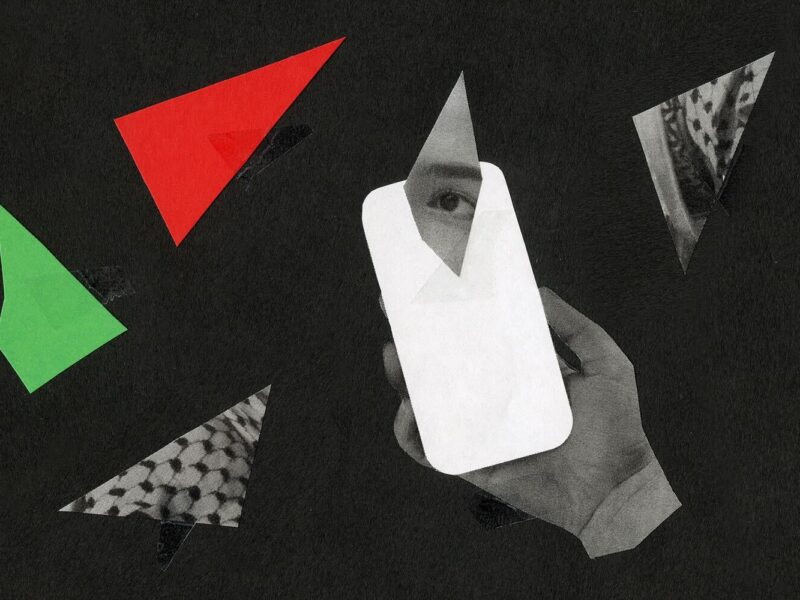Refugees trying to enter Europe are encountering border patrols that turn them back with brutal violence, which rights workers say is systemic.
It’s around midnight in the Croatian forest, and trees block out most of the moonlight. Five days ago, four men—one Palestinian and three Algerian—crossed the Bosnian border into Croatia, and they have been walking ever since. A few moments ago, they met an Iranian woman with two young children.
Suddenly four police officers appear, shouting: “On your knees, sit down, sit down!”
The police search the men for their phones, and tell them to hand over their money. They force the men to strip, while the woman and children are separated from the near-naked men. One man, who tells this story to an NGO in November 2020, describes the police making a fire and burning the group’s jackets and backpacks, while one officer drinks whisky and throws out insults.
“He said weird words. I don’t want to repeat them. But I can tell you it was without any respect. He insulted my mother, my sister, everyone. Weird words,” he said.
This is what he claims happens next.
The officers found long branches in the woods, and used them to beat the men.
The group was eventually taken to a small lake near the Croatian-Bosnian border. Waiting for them are 13 or 14 men in balaclavas, and the man telling this story believes they are police.
“And then the fight started. The first one had to go there. ‘Get naked!’ and then they hit him. After. The second one: ‘get naked’ and then bam, bam, bam. Next one: bam, bam, bam. It was like war,” he said.
The masked men used branches, metal batons, and their fists. The mother and two children watched from a distance.
“Then they say to us: ‘now swim’. Just imagine. It was night. So dark and so cold. Then they started throwing big rocks in our direction into the water. Imagine. It was dark, the men had been drinking. What if a rock would hit my head?”
As the men get out of the water, they are forced to walk across the border, back into Bosnia. Behind them, the masked men fire their guns.
This story was recorded by the Border Violence Monitoring Network, a group monitoring human rights violations at the EU’s external borders. While this is the account of one person, it is not an isolated incident. Right across Europe, the evidence shows that refugees and migrants are being forced back across country borders. These pushbacks are not only illegal, they are often violent.
The evidence is mounting
A new report from the End Pushbacks Partnership and non-profit project Refugee Rights Europe shows the extent of these pushbacks at both land and sea borders.
There is evidence of violence on almost every border covered in the report. In Greece, video evidence shows the coast guard shooting into the water next to boats, in Slovenia far-right militias patrol the razor-wire fence borders, and in Turkey people have been shot as they try to cross into Greece.
Violence aside, pushbacks go against everything the EU stands for. Under the EU Charter of Fundamental Human Rights, mass expulsions are prohibited. It’s also unlawful for anyone to be pushed back to a country where there’s a serious risk that they’ll face the death penalty, torture, or any other inhuman or degrading treatment. Beyond this, EU Member States must guarantee the right to claim asylum—a right that is rooted in international refugee law.
Selma Mesic is the Greece and Balkans coordinator at Refugee Rights Europe, and she’s also part of the team behind the End Pushbacks Partnership, which has put together this report. She said it’s clear that these violent pushbacks aren’t the result of rogue officers.
“This is systematic,” she said. “It’s really hard to imagine all of this being done on a random basis.”
“Both by the number of people, but also the geographical reach of this trend, it seems entirely implausible that there are such common methodologies and tendencies happening across this many borders,” she said.
Pushbacks are happening in the thousands. The vast number, Mesic said, means it’s impossible for this to be the work of a few rogue individuals.
Violence at sea
The land and sea borders between Turkey and Greece are common routes for people making their way into the Schengen Area, where there is officially no passport control between the 26 European countries, although some countries are exercising temporary border controls.
On the Greece-Turkey sea border, like so many others in the report, evidence has been found of violence and illegal pushbacks. Much of this violence, according to the report, comes at the hands of the Hellenic (or Greek) Coast Guard.
A video published by the BBC shows this playing out in real time. As people try to enter Greek waters on a small dinghy, people on the large coast guard boat shoot into the water, push at the dinghy with a pole, and create waves, rocking the overcrowded vessel.
When asked for comment, a representative from the Ministry of Foreign Affairs and the Hellenic Coast Guard sent an official response.
“The officers of the Hellenic Coast Guard who are responsible for guarding the Greek and European sea and land borders have for months maximized their efforts, operating around the clock with efficiency, a high sense of responsibility, perfect professionalism, patriotism, and also with respect for everyone’s life and human rights. Their actions are carried out in full compliance with the country’s international obligations.
As for the tendentious allegations of supposed illegal actions, we must emphasize that the operation practices of the Greek authorities have never included such actions.”
When directed to the specific BBC video evidence, the Press Officer of the Ministry for Maritime Affairs, Mr Kokkalas, responded:
“This video was reproduced in March 2020, a period during which our country received a sudden, massive, organized and coordinated pressure from population movements to its eastern land and sea borders. This situation was an active, serious, exceptional and asymmetric threat to the country’s national security.”
In March 2020, pushbacks from Greece escalated. The global Coronavirus pandemic was sending the continent into lockdown, and Turkey had just opened its border with Greece in order to put pressure on Europe. Turkey is currently host to around 3.6 million refugees; in 2016 the EU and Turkey made a deal to put an end to dangerous sea crossings —a one in, one out policy with a financial incentive for Turkey to the tune of €3 billion. They agreed that for every Syrian refugee that Turkey took back from the Greek islands, the EU would resettle one Syrian refugee from within Turkey. But since then, there have been a number of disputes, including Turkey’s view that the EU has not kept their side of the bargain, and has not helped to manage the crisis in Syria. Opening the border meant more pressure on a struggling Greece, and more fuel for the fire of right-wing political groups in Europe.
The Greek Prime Minister, Kyriakos Mitsotakis, announced: “Our national security council has taken the decision to increase the level of deterrence at our borders to the maximum. As of now we will not be accepting any new asylum applications for one month.”
“Do not attempt to enter Greece illegally,” he said. “You will be turned back.”
A new trend also emerged, according to Mesic, where people are apprehended after they’ve landed on the Aegean islands, and are then pushed back.
She explains that people are put into detention, and then taken back out to sea, abandoned near Turkish waters on small life rafts designed for emergency sea rescues. The rafts have no motors, and the people are left drifting in the ocean. All this has been detailed in multiple testimonies collected by Human Rights Watch.
The people interviewed also said that Greek officers stole their belongings, including ID and money. The coast guard said they have rescued thousands of migrants.
Among the Human Rights Watch testimonies, Hassan (not his real name), a Palestinian refugee from Gaza, said this:
“The Greek Coast Guard put us in a big boat. We drove for three hours but then they put us in a small boat. It was like a raft. It was inflatable and had no motor. Like a rescue boat they keep on big boats in case there is an emergency. They left us in the sea alone. There was no food or water. They left us for two nights. We had children with us.”
Alongside reports of pushbacks, there are also heroic stories of rescue, both from the coast guard and civil society groups. Refugee Rescue, the last search and rescue boat working from the island of Lesvos, worked for five years to save the lives of people crossing the Aegean sea. But the organization said it has had to suspend its operations because a deteriorating situation means their work is no longer safe.
The perpetrators of pushbacks
At the land border, a similar story is unfolding. Mounting evidence shows that people are not only being pushed back by authorities, but that unidentified masked men are playing a role in the process.
“There’s no clear understanding of exactly who they are,” Mesic said.
“A lot of the testimonies given by victims of pushbacks, say they’re apprehended close to the river, then they’re driven on little motorboats across the river on towards the Turkish side. They tend not to speak, because, I would presume, they don’t want to betray an accent or a specific language that they’re speaking which could identify them.”
Mesic said the men wear masks and black clothing. She believes it’s a deliberate attempt to make sure they can’t be identified.
Countless claims of violence by Greek authorities have been collected by The Border Violence Monitoring Network (BVMN).
In one report, they speak to a Moroccan man, who said he has been pushed back to Turkey seven times.
“If you come back to Greece, we will kill you.” These are the words he claims were levelled at him by a Greek officer, after he and his fellow travellers were picked up in Orestiada, a village near the Turkish border in July 2020.
BVMN said the group was taken to a nearby police station, where their phones were confiscated, and they were given no food or water. The next day, they were taken to another police station, where officers threw water on them, stripped them, and, according to the man’s statement, beat them with metal batons. He added that they were not given any opportunity to claim asylum.
When BVMN interviewed him a month later, the man still had bruises on his back.
Police eventually took the men to the border and forced them to look at the ground while threatening them with guns. Masked men beat anyone who dared look up.
“If you look at them, they can hit you until you die. They don’t care about this. We were so scared,” he told BVMN.
They were forced across the river, back into Turkey.
Greek police did not respond to requests for a comment.
A Europe-wide problem
The situation on the border between Greece and Turkey is just one example, and similar stories are playing out on borders between Schengen countries too.
In France, people have been pushed back to Italy for a number of years. The 515km (320 mile) border has essentially been closed since 2015, following terror attacks in the country when a State of Emergency was declared.
However, some groups such as Anafé (National Association of Border Assistance for Foreigners) say these border controls are being used as a way to fight immigration.
“It’s not something you’d expect. They’re both EU countries. You think they’d be more aligned with their human rights and fundamental rights provisions. But clearly not, because these pushbacks are happening at a high rate,” said Selma Mesic.
The pushbacks typically happen after people are searched and arrested on trains or at train stations, and there are also claims of racial profiling. According to the End Pushbacks report, people are locked up in inhumane conditions; their personal documents are stolen and they are denied the right to claim asylum.
Unaccompanied minors are also being pushed back. Several civil society groups report that authorities often change dates of birth on forms so that children (who are entitled to specific provisions and protections) are classed as adults. In fact, in 2018, Anafé brought a major class action involving 20 cases of minors being pushed back to Italy. They won the case.
Beyond the violent pushbacks happening on European borders, is the problem of chain refoulement, where people are forced back across multiple borders. Through this practice, their lives are put in even greater danger.
On the Italian border, people are being pushed back into Slovenia, and then further along the Balkan route. They are forced into Croatia, Bosnia Herzegovina, and Serbia, where they often face inhumane conditions. People face police violence, homelessness, and destitution. Their right to seek asylum is often violated.
Mesic explains that along the Balkan route, people are apprehended, driven to the border, and handed over to the equivalent officials on the other side. Many countries, she said, are leaning on their readmissions agreements to claim that everything is being done within the law.
“It’s really easy to poke holes in that, because there are a lot of fundamental rights that are not being respected—the right to seek asylum, the right to have an interpreter or to receive information about your rights. Some of these rights are actually covered by readmissions agreements, but they’re not really practised,” she said.
Raising the alarm
The groups behind this report are calling for urgent action. Together, they’ve set out a list of EU advocacy demands.
“We need effective access to asylum registration on both the EU external and internal borders, and to make sure that the safeguards and the right to asylum are upheld, because with the pushbacks happening, the right to asylum is gravely undermined,” Mesic said.
The group also wants to see an end to illegal detention practices, to end racial profiling, and to see a respect for the Schengen border code. They also want assurances that agencies, particularly European border and coast guard agency FRONTEX, are being held to account. They want to know that this work is carried out in line with the EU’s human rights obligations.
“The European Commission must hold member states to account,” Mesic said.
She said that all the rules and guidelines are already in place, but that there don’t seem to be any consequences when they are broken. The Schengen border code and the EU charter should provide the right protections, but the rules, based on the evidence, are not being respected.



